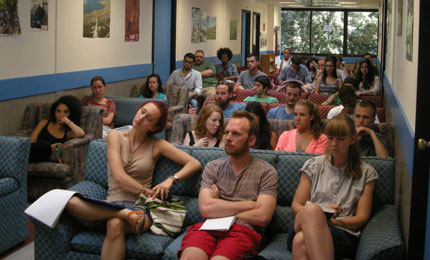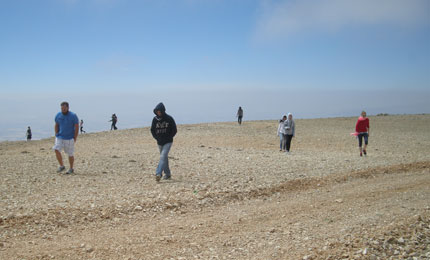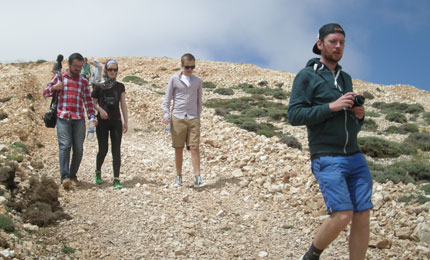The show must go on
SINARC program continues to attract students despite regional turmoil.

The six-week summer program attracts students from around the globe who take courses in both classical and colloquial Arabic.
Six weeks after roughly 40 Arabic students first gathered in the corridors of Irwin Hall, they have found themselves bidding each other farewell. This summer’s crop of SINARC students came from across the globe and their transformation from that first day in class is undeniable. Not only has their Arabic ability improved dramatically, they have gone from strangers to close friends.
The decision to come to Lebanon was not an easy one for these students. Recent political events have prompted many countries to issue warnings against travel to the country, but that didn’t stop these adventurous scholars from enrolling in the SINARC program and experiencing all that Lebanon has to offer.
For Danish student Jonathan Tybjerg, “Coming to SINARC was a way to open myself up to this part of the world and to gain a new language skill.”
The appeal of SINARC is not only academic. It offers the added benefit of learning Arabic in a country where it is spoken, however sporadically. Australian Eleanor Clyne-Kingshott described the magnetism of Lebanon: “It’s a good starting point to learn Arabic for those interested in the region, and there is less risk of culture shock than there is in other Arab countries.”
This neatly echoes SINARC Director Dr. Mimi Milki Jeha’s opinion on why Beirut is such a desirable city to study in.
“Beirut is its own city with its own unique atmosphere that is quite different from a typical Middle Eastern metropolis,” she says, referring to the capital’s open and relatively liberal environment.
As part of the program, SINARC organizes trips throughout the country, hosts lectures on the culture and politics of Lebanon and the wider region, and offers cooking classes featuring local cuisine.
Although six weeks may not seem like a long time, it was long enough to ensure students took in Lebanon’s sights — including the Cedars, Byblos and Tyr.
Camilla Paulsen, another Danish student, appreciated the combination of language instruction and cultural excursions. “It helped me gain a deeper understanding of the country and the region,” she said.
While it has been been frustrating to see events in the region affect enrollment, some were able to see a silver lining. “The plus side of the smaller numbers was that the program was intimate,” said Tybjerg. “A smaller class helps you stay engaged at all times.”
As students slowly make their way home, it is clear they enjoyed their summer in Lebanon. And for her part, Jeha believes the students also learned another important lesson, “that life goes on in Lebanon no matter what.”
More
Latest Stories
- Into the Psychology of Justice
- Alumnus Zak Kassas on Navigation, Spoofing and the Future of GPS
- Hearing Between the Lines
- LAU Hematology Conference 2025: Advancing Science Through Interdisciplinary Exchange
- Dr. Chaouki T. Abdallah Invested as LAU’s 10th President
- LAU Guides Its Students Through the Code of Conduct
- Innovative Procedure at LAU Medical Center–Rizk Hospital Signals Hope for a Patient With a Congenital Disease
- LAU’s Inaugural PodChat Session Addresses AI Detection in the Classroom



